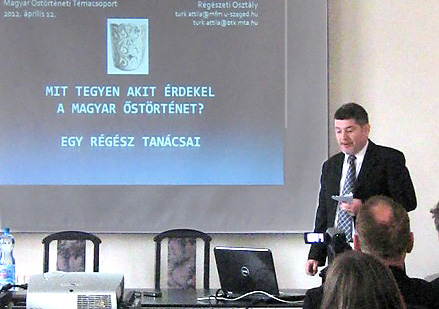The Hungarian Prehistory Research Team of the Research Centre for the Humanities (Hungarian Academy of Sciences) held its first lecture and discussion session on 12 April, 2012.
The lecturer, Attila Türk is an archaeologist (Szeged University), who has been analyzing more than 50 archaeological collections in East-Europe concerning Hungarian prehistory in the past five years. In this lecture he demonstrated that a thorough examination of the relationship of the archaeological finds of the Hungarian Conquest in the Carpathian basin (895) with the Eastern European finds can help to clarify the interrelation between them and thus to determine the role and contribution of the new findings in Hungarian prehistory research. He also emphasized the need to revalue our present knowledge about Hungarian prehistory and the Conquest in the light of the new findings. These new archaeological results from Russia, Ukraine and Moldavia are, unfortunately, not generally known among the Hungarian scholars yet, though they can have decisive significance in the Hungarian prehistory research, as they do not always support the presently accepted theories about the stations and chronology of the migration of the pre-Hungarian and the Early Hungarian age. Moreover, the presently supposed way of life of the Early Hungarians (nomadic) can be questionable on the basis of the new research (including new natural history and climate history research) results, and a new approach seems more suitable to define their way of life, with some planting and nomadic or half-nomadic pastoralism. He also emphasized the importance and need for the cooperation of different fields of study, including natural sciences with new research methods, for a comprehensive prehistory research.



